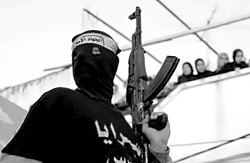Iraq becomes nursery of terrorism, Russian expert believes
As for the roots of the conflicts, drawing a comparison between Chechnya and Iraq is impossible

Anatoly Safonov, the presidential envoy for questions connected with struggle against terrorism, organized crime and drug trafficking, is an influential political figure in Russia. According to the expert, the number of organizations that deal with the anti-terrorist struggle in Russia is impossible to count. “Efficient cooperation and coordination is the most difficult goal to achieve at this point. It took the USA 17 years to build the anti-terrorist system. Achieving coordinated actions between 37 departments became the most difficult aspect in the process of creating the system in the USA,” the specialist said in an interview with the Nezavisimaya Gazeta. 
There is a core of anti-terrorist organizations in Russia, but there is a separate group of institutions that deal with anti-terrorist activities as well: they include medical, women's organizations and the civil society. Issues of coordination arise on a regular basis, when several organizations may compete with each other in their activities or if nobody conducts any activities at all.
Anatoly Safonov believes that the Russian anti-terrorist system has made considerable progress since last year's hostage crisis in Beslan. Russian special services developed a more sophisticated approach to collecting and analyzing information, first and foremost.
There is a so-called super-department in the USA, the Department for Homeland Security. It took US specialists enormous efforts to establish the department. The US society realized that contradictory information is highly harmful to the state: it may easily mislead the political administration of the state in making political decisions of paramount importance. The experience of the US-led campaign in Iraq is quite significant at this point. US politicians believe now that the information from US special services was not precise, whereas intelligence departments say that the government misinterpreted the information, which they had provided. This problem appeared as a result of insufficient cooperation. The US authorities eventually decided to introduce a new state position – the person, who would be in charge of analyzing the intelligence information.
The US Department for Security became a super-department, which can be compared with the Soviet Union's KGB, Anatoly Safonov believes. According to the specialist, Russia could follow the example of the USA and establish a similar department too. However, the image of the almighty KGB is still rather strong in Russia: the new era requires the establishment of a new structure.
Having launched the war in Iraq, the USA gave rise to terrorism in the country. Now the USA is trying to struggle with terrorism, spending enormous financial resources on anti-terrorist efforts. Russia also spends considerable funds on the struggle with terrorist, although the Russian administration can make incorrect decisions in Chechnya too.
One may say that Iraq has become a nursery of terrorism. If a gunman comes to Iraq from Yemen, for example, he will be given ideological and terrorist training and eventually become a part of the system. Circumstances are similar with Chechen terrorists in Russia – the comparison can be made from the technical point of view. As for the roots of the conflict and solutions for its regulation, drawing a comparison between Chechnya and Iraq is impossible.
Russian security services realized in the beginning of the 1990s that the republic of Dagestan was one of the most hazardous territories in Russia. This is a multi-national republic, where none of its nationalities can be distinguished as a predominant one. There are six basic nationalities there, which historically control and share their power. The people used this fact when they were launching the conflict in the republic. Dagestan is a highly problematic issue for Russia, for one may witness a variety of crimes there based on terrorism, gangsterism, ethnic peculiarities, territorial issues, etc. There is no one single approach to the Dagestan problem, because the external factor, the so-called Chechen influence, plays the key role.
Russian special services conduct an active cooperation with Latin American states. Anatoly Safonov has recently visited Ecuador. The visit was timed to the forthcoming celebration of 60 years of diplomatic links between Russia and Ecuador. The struggle with terrorism, drug trafficking, money-laundering and organized crime needs new forms of cooperation against the background of global changes.
Russia maintains strong anti-terrorist ties with other regions, such as Europe, the Islamic world, Asia, Africa, the USA, the Balkans, Afghanistan, Iraq. International special services, law-enforcement bodies, defense departments, customs and border services have established over 30 workgroups to struggle with terrorism and new threats.
Transboundary threats and drug trafficking are two major challenges in Latin America. Terrorism manifests itself in a smaller capacity, although there is information that says that certain Latin American states collect contributions to terrorist organizations. In addition, al-Qaeda supposedly considered Latin America as a possible rear base, Anatoly Safonov said.
Criminal and terrorist network are merging nowadays, developing joint infrastructure and bases. The amalgamation of radical political and religious ideas is especially dangerous at this point.
Subscribe to Pravda.Ru Telegram channel, Facebook, RSS!


